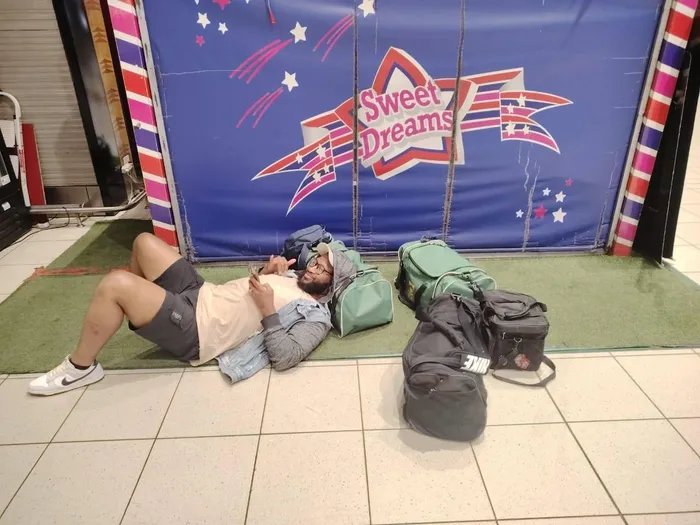
One of the rugby players from the Eastern Cape who had to sleep at OR Tambo International Airport due to their scheduled flight not being able to land at King Phalo Airport.
Image: Facebook
FlySafair, the low-cost domestic airline, is under fire for its handling of a recent situation involving three players from the South African Deaf Rugby Association, who experienced significant distress during their travel.
The incident has raised questions regarding the airline’s commitment to inclusivity, particularly for passengers with disabilities.
Daron Mann, head of communications for the Eastern Cape Deaf Rugby Association, took to Facebook to express his dismay over the treatment of the players.
He detailed the unfortunate circumstances they faced during their journey returning from training camp.
According to Mann, the trio found themselves stranded at Johannesburg's OR Tambo International Airport (ORTIA) after their flight failed to land at Gqeberha's King Phalo Airport.
The flight was rerouted to Cape Town International Airport, then back to Johannesburg, with the players, who found themselves having to spend the night on the benches and on the floor at ORTIA.
Mann noted that the players were left in an uncomfortable situation without adequate communication or support, as no food or accommodation for the night was offered to them.
"No sustenance offered or provided apart from a tiny bottle of water. As of this morning, they were still waiting to head back to PE after sleeping in the airport.
"After spending R42K+ on flights with FlySafair this weekend to get all our players to the camp, we really would have appreciated a little more care and communication," said Mann.
In response to the incident, Kirby Gordon, FlySafair's chief marketing officer, explained that flight FA238 was unable to land in Gqeberha due to a technical fault affecting the airport’s Instrument Landing System (ILS).
He clarified that the fault was caused by moisture damage to the antenna array, which is maintained by Air Traffic and Navigation Services (ATNS) and not by the airline itself.
"Weather and technical infrastructure issues at destination airports are beyond any airline’s control, and while our teams work hard to minimise disruption, safety must always come first," he said.
Gordon also stated that the airline's primary channel of communication during irregular operations is SMS, using the mobile number supplied in the booking, and three messages were sent to all passengers on this flight between 19:27 and 23:39, advising of the diversion, cancellation, and re-accommodation details, each containing links for further information and rebooking options.
"We can confirm that these notifications were delivered successfully, in written form, to the number recorded for the booking."
When it comes to providing passengers with meals and accommodation, Gordon stated that FlySafair is not an all-inclusive service airline and does not provide overnight accommodation or meals in cases of weather or air-traffic-infrastructure disruptions as stipulated in the Terms and Conditions of Carriage.
"We strongly recommend that passengers, and organisations booking on behalf of groups, consider purchasing travel-delay insurance (available on our website) which provides cover for accommodation and meal costs arising from such events," he said.
Gordon added, "We extend our sincere apologies to the three Deaf Rugby South Africa players and to all other passengers affected. While the situation arose from factors outside the airline’s control, we are deeply sorry for the distress and fatigue it caused."
Lauren Terras, vice president of the South African Deaf Rugby Association, expressed disappointment, noting that while flight delays are often unavoidable, the conditions under which the players were left stranded were unacceptable.
“What’s most concerning is that the team had to spend the night on the ORT airport floor, with only one bottle of water provided,” Terras said.
“We truly hope FlySafair can review how situations like this are managed - ensuring all passengers, especially those with special communication needs, are treated with the care and respect they deserve.”
Related Topics: